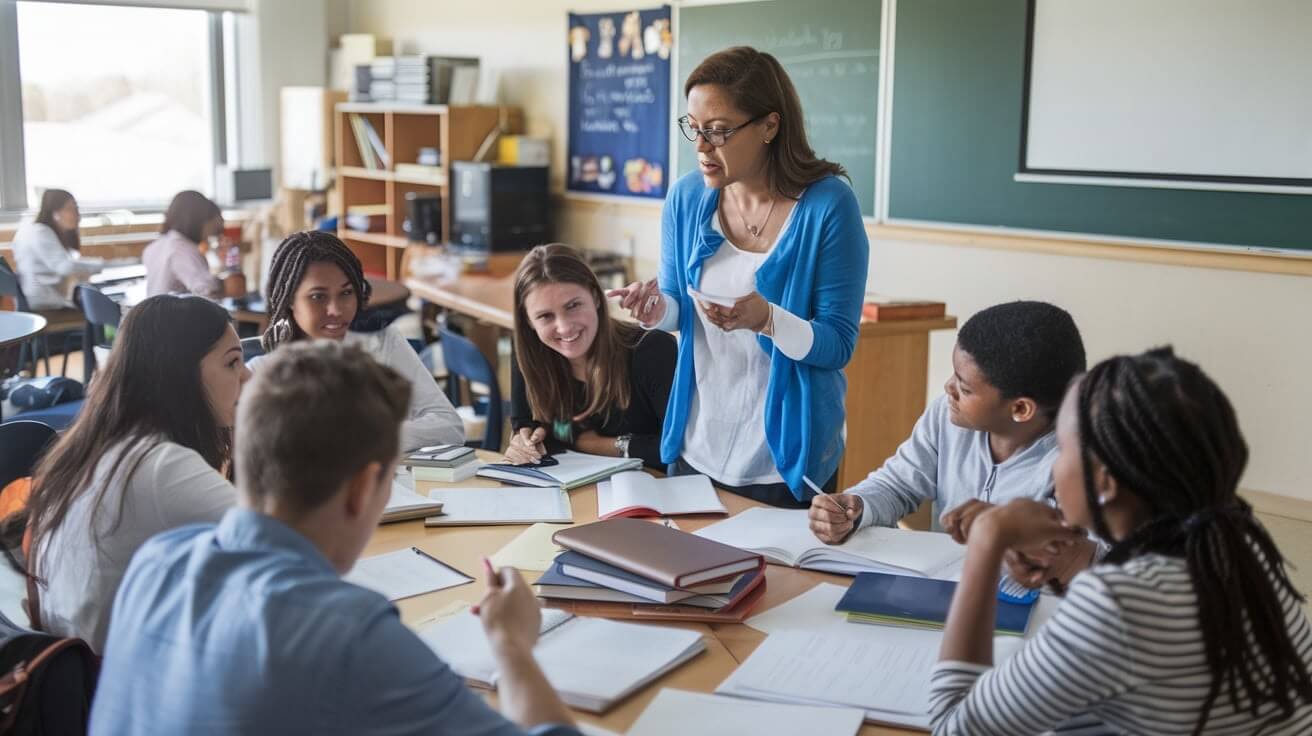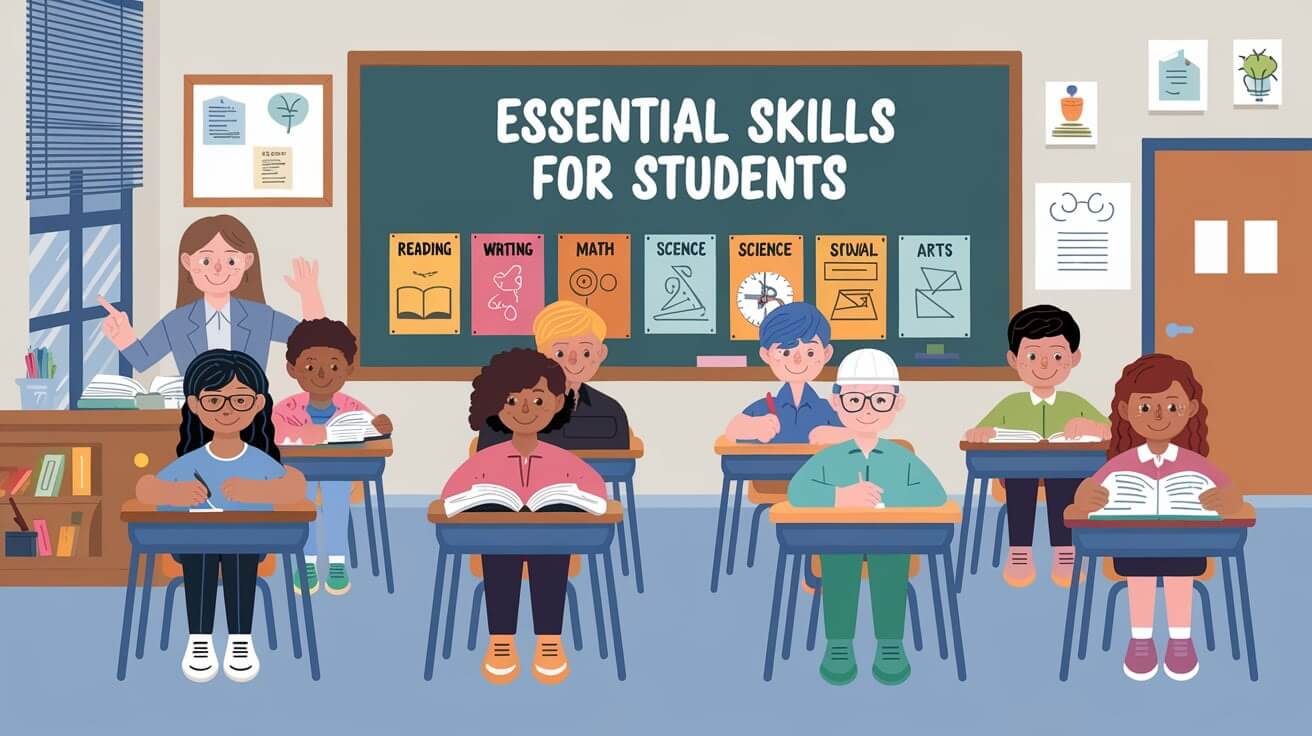
20 Skills Every Student Needs for Effective Learning
Do you sometimes feel overwhelmed by the demands of school or college? Balancing coursework, projects, and exams can be challenging, but what if there was a way to make learning more effective and manageable? The secret lies in developing essential skills that help you succeed academically and prepare you for challenges beyond the classroom.
In this article, we'll explore 20 student skills for effective learning. These skills cover everything from time management to stress relief, ensuring you have the tools to tackle any academic hurdle.
You'll discover practical tips, relatable examples, and actionable advice to help you learn more intelligent, not more challenging. Let's dive in and see how mastering these skills can transform your learning experience.

1. Time Management
Time is one of the most valuable resources students have. Managing it effectively allows you to balance your studies, extracurricular activities, and personal life without feeling overwhelmed or burned out. Time management is not just about doing more; it's about doing the right things at the right time.
How to Get Started:
Start by prioritizing your tasks. Use the Eisenhower Matrix, a tool that helps you categorize tasks into four categories: urgent and important, important but not urgent, urgent but not essential, and neither urgent nor essential. Tackle the urgent and important tasks first, and avoid wasting time on low-priority activities.
Helpful Tools:
Use digital platforms such as Google Calendar, Notion, or Trello to visually organize and plan your schedule effectively. Set reminders for deadlines and block specific time slots for studying, leisure, and relaxation.
Personal Example:
During my last semester, I was swamped with assignments and exam preparation. To manage my time, I created a schedule that allocated two focused hours every morning to study a challenging subject and one hour in the evening for revision. I even blocked 30 minutes daily for relaxation, which kept me refreshed. This disciplined approach improved my productivity and reduced last-minute stress.
2. Communication Skills
Strong communication skills are a cornerstone of academic and personal success. Being able to express your thoughts and ideas ensures you can participate effectively in class discussions, collaborate on group projects, and establish positive relationships with peers and teachers.
How to Develop Communication Skills:
Focus on verbal and nonverbal communication. Practice speaking confidently and concisely, whether you're answering questions in class or giving a presentation. At the same time, pay attention to nonverbal cues like body language, eye contact, and facial expressions, which play a significant role in how your message is received.
Active Listening:
Effective communication isn't just about talking—it's also about listening. Engage in active listening by focusing entirely on the speaker, showing acknowledgment with a nod, and asking thoughtful follow-up questions.
Personal Example:
Clear and respectful communication among members greatly impacted a group project. By listening actively to others' suggestions and expressing my ideas confidently, we completed the project on time and received positive feedback from our instructor.
3. Collaboration
Collaboration is essential for students, as teamwork is a regular part of academic life. Whether it's a group project or a study group, knowing how to work well with others can significantly improve outcomes.
How to Collaborate Effectively:
Start by understanding your role within the team. Be open to sharing ideas and accepting feedback, even when it challenges your perspective. Encourage others to contribute by creating an inclusive and respectful environment.
Conflict Resolution:
Disagreements can arise during group work, but learning to address them constructively is vital to collaboration. Use clear communication and empathy to resolve conflicts, ensuring the team stays focused on its goals.
Personal Example:
My team needed help to decide on a final approach during a science project. I suggested we list all ideas, vote on the best option, and assign tasks accordingly. This structured collaboration allowed us to stay on track and achieve a high grade while improving our teamwork skills.
4. Note-Taking
Taking practical notes is an essential skill that supports successful learning and understanding. Well-organized notes make retaining and reviewing information easier, especially during exams.
Choosing a Method:
Several note-taking methods include the Cornell Method, mind mapping, and bullet points. The Cornell Method, for instance, divides your notes into sections: one for main ideas, one for details, and one for summaries. Mind mapping works well for visual learners who want to connect ideas graphically.
Using Technology:
Apps like Evernote or Microsoft OneNote can help you digitally organize and access your notes. You can even include multimedia elements like images, audio recordings, or links for better context.
Personal Example:
In my economics class, I struggled to keep up with the fast pace of lectures. I switched to the Cornell Method, which allowed me to focus on key points during the lecture and add detailed explanations afterward. My exam preparation became much easier, and I scored higher than expected.
5. Research Skills
Strong research skills are critical for academic success. Whether writing a paper or preparing for a presentation, knowing how to find, evaluate, and use information effectively sets you apart.
How to Improve Research Skills:
Start by identifying credible sources. The best options are peer-reviewed journals, academic books, and reputable websites. Learn to evaluate information critically by checking for author credentials, publication dates, and supporting evidence.
Citing Sources:
Correctly citing your sources avoids plagiarism and adds credibility to your work. Depending on your course requirements, familiarize yourself with APA, MLA, or Chicago citation styles.
Personal Example:
For a history project, I needed to research the Industrial Revolution. I gathered high-quality information using academic databases and verified my sources' reliability. Proper citations earned me extra marks and praise for the professionalism of my work.
6. Adaptability
Adaptability refers to the skill of adjusting swiftly to new situations and challenges. Flexibility and openness to learning new methods or technologies are crucial to success in the ever-changing academic environment.
How to Enhance Adaptability:
Start by viewing challenges as opportunities for growth. Practice mindfulness to stay calm and focused when unexpected changes occur. Stay open to learning new methods or techniques, whether it's transitioning to online classes or adjusting to the dynamics of a new group project.
Real-Life Example:
During the pandemic, my school transitioned to online learning. I struggled with technology initially, but I quickly adapted by exploring tools like Zoom and Google Classroom. Over time, I became comfortable with virtual discussions and online submissions, which improved my productivity.
7. Collaboration
Collaboration is a skill that extends beyond academic group projects—it's also vital in personal and professional life. Effective collaboration in a team setting ensures mutual success and promotes collective growth.
How to Collaborate Successfully:
Respect everyone's opinions and contributions. Assign clear roles to avoid confusion and ensure accountability. Create open communication channels so team members feel comfortable sharing their thoughts.
Conflict Management:
Disagreements are common in teamwork—address conflicts immediately by discussing concerns openly and finding compromises that satisfy everyone involved.
Personal Example:
In a science fair project, my team divided tasks based on each member's strengths. I focused on research, while others handled the presentation and visuals. This teamwork led to a well-organized project that earned us second place.
8. Problem-Solving
Problem-solving involves identifying challenges, analyzing them, and finding practical solutions. This skill is essential for tackling complex academic assignments and overcoming personal obstacles.
Steps to Solve Problems:
-
Clearly define the problem.
-
Analyze the underlying causes.
-
Generate possible solutions and evaluate their advantages and disadvantages.
-
Please choose the most practical solution and implement it.
Creative Problem-Solving:
Sometimes, traditional methods need to be revised. Different approaches often inspire innovative solutions, particularly in creative or team environments.
Example:
My team needed help finding reliable resources when faced with a group assignment on an unfamiliar topic. We reached out to our teacher for guidance and discovered useful academic journals. This proactive approach saved us time and improved our project quality.
9. Self-Motivation
Self-motivation is the internal drive to pursue and achieve goals without relying on continuous external support. It's a critical skill for maintaining focus, especially during challenging times.
How to Stay Motivated:
Set small, achievable goals to maintain momentum. Create a vision board or list of rewards for reaching milestones. Stay motivated by surrounding yourself with uplifting influences, like encouraging friends or inspiring quotes.
Building Discipline:
Motivation can wane over time, so discipline plays an important role. Stick to a routine to maintain consistent progress even when you don't feel like it.
Personal Example:
During finals, I struggled with procrastination. To stay motivated, I set daily goals and rewarded myself with short breaks after completing each task. This approach kept me on track and boosted my confidence.
10. Technological Proficiency
In today's education system, being proficient with technology is optional but necessary. Technological skills help streamline learning and enhance productivity from digital tools to online platforms.
Essential Tools:
Get comfortable using tools like Microsoft Office, Google Drive, and learning platforms like Canvas. Learn to use video conferencing apps like Zoom for virtual meetings and presentations.
Staying Updated:
Technology evolves rapidly. Stay updated about new tools and features that can improve your learning experience. Online tutorials and resources can help you upgrade your skills quickly.
Real-Life Example:
For a business studies project, I created visually appealing infographics using Canva and PowerPoint for my presentation. These tools impressed my teacher and made the content more engaging for my peers.
11. Note-Taking
Effective note-taking is a cornerstone of successful learning. Good notes serve as a roadmap for understanding lectures, organizing thoughts, and preparing for exams.
Choosing a Note-Taking Style:
Several methods can help you take notes more effectively. The Cornell Method divides notes into main ideas, details, and summaries, while mind mapping visually connects concepts for better understanding. Bullet points work well for concise, straightforward information.
Using Digital Tools:
Apps like Evernote, Notion, or Microsoft OneNote allow you to organize and access notes from any device. You can also enhance your notes with multimedia elements like voice recordings or images.
Personal Example:
When studying for a history exam, I adopted the Cornell Method. My revision sessions were more focused and efficient, as I jotted down key dates and events during lectures and added summaries later, leading to better grades.
12. Reading Comprehension
Reading comprehension is essential to understanding and remembering information from written material. This skill applies to everything from textbooks to academic articles.
How to Improve Reading Comprehension:
-
Highlight or underline key points while reading.
-
Summarize paragraphs in your own words to check your understanding.
-
Ask questions like "What is the main idea?" or "How does this relate to my subject?"
Active Reading Techniques:
Active reading involves engaging with the material. Annotating the text, making notes in the margins, or creating visual summaries can deepen your understanding.
Personal Example:
While preparing for a literature exam, I needed help to grasp complex themes in a novel. I started summarizing each chapter and writing down key quotes, which helped me analyze the text more effectively and improved my essay responses.
13. Test-Taking Strategies
Exams can be daunting, but the right strategies can help you perform at your best. Test-taking isn't just about what you know—it's also about how you approach the exam.
Before the Exam:
Create a study plan that includes reviewing past papers, summarizing notes, and practicing time management. Identify your weak areas and dedicate extra time to them.
During the Exam:
Carefully review the instructions and plan your time for each section accordingly. To build confidence, start with the questions you know, then move on to the more challenging ones.
Personal Example:
For a math exam, I practiced solving past papers under timed conditions. This not only helped me manage time during the actual test but also reduced my anxiety, resulting in a higher score than expected.
14. Goal Setting
Establishing goals keeps you focused and allows you to track both academic and personal progress. When your goals are clear and achievable, they give you a sense of direction and purpose.
How to Set SMART Goals:
SMART stands for Specific, Measurable, Achievable, Relevant, and Time-bound. For instance, instead of saying, "I want to improve in math," set a goal such as, "I will score 85% on my next math test by practicing 30 minutes daily for two weeks."
Tracking Progress:
Use tools like planners or goal-tracking apps to monitor your achievements and adjust your plans.
Personal Example:
At the start of the semester, I set a goal to improve my class participation. I committed to asking at least one question or contributing one idea during every discussion. By the end of the semester, I noticed a significant boost in my confidence and grades.
15. Stress Management
Stress is a natural part of student life, but managing it practically is crucial for maintaining mental and physical health. Excessive stress can hinder performance and motivation.
How to Manage Stress:
-
Regularly practice relaxation techniques like deep breathing or meditation.
-
Divide your tasks into small pieces, which are more manageable steps to prevent feeling overwhelmed.
-
Engage in regular physical activity and maintain a nutritious, balanced diet to boost your energy and sharpen your focus.
Creating a Routine:
Dedicate time to hobbies or relaxing activities, like reading, painting, or enjoying time with friends. A healthy balance between work and leisure helps keep stress at bay.
Personal Example:
During finals, I felt overwhelmed by the material I needed to review. I started practicing yoga for 15 minutes each morning, which calmed my nerves and improved my concentration. As a result, I felt more prepared and less anxious.
16. Financial Literacy
Financial literacy is managing money wisely—a vital skill for students navigating personal budgets, scholarships, or student loans. Learning to handle finances early sets the foundation for financial independence in adulthood.
Budgeting Basics:
Start by tracking your income (allowances, part-time job earnings, or scholarships) and expenses (books, meals, transportation). Use Excel spreadsheets or budgeting apps like Mint to organize your finances.
Smart Saving:
Set aside part of your income to meet future needs. Over time, small savings can grow and be a financial safety for unforeseen costs.
Personal Example:
I created a weekly budget to manage my food and transportation expenses when I started college. By sticking to it and setting aside some money each month, I could afford a much-needed laptop for my studies without relying on credit.
17. Cultural Competence
Cultural competence involves recognizing, understanding, and respecting diverse perspectives and backgrounds. In today's interconnected world, students encounter peers from various cultural backgrounds, making this skill essential for collaboration and personal growth.
Building Cultural Awareness:
Engage in conversations with people from different cultures. Attend cultural events and exchange programs or join student clubs promoting inclusivity.
Fostering Inclusion:
Recognize and challenge your biases. Create a good environment where everyone feels respected and appreciated, particularly during group projects or social gatherings.
Personal Example:
I worked with international students in a study group who brought unique perspectives to the discussion. Learning about their approaches to problem-solving not only enriched my understanding but also improved our group performance.
18. Ethical Understanding
Ethical understanding involves knowing and adhering to moral principles in academic and personal settings. It guarantees that decisions are guided by integrity and fairness.
Practicing Academic Honesty:
Avoid plagiarism by adequately citing all sources and maintaining originality in your work. Follow guidelines on collaboration to ensure you respect academic rules.
Developing Personal Ethics:
Think critically about your values and how they align with your actions. Use ethical reasoning to resolve conflicts and make decisions that benefit everyone involved.
Personal Example:
During a research project, I noticed that some of my team members were tempted to copy content from online sources. By reminding them of the importance of originality and helping them cite properly, we completed the project ethically and received commendation from our professor.
19. Public Speaking
Public speaking is valuable for presenting ideas clearly and confidently in class discussions, group projects, or formal presentations. Developing this skill helps you engage your audience and convey your message effectively.
Improving Public Speaking Skills:
Practice in low-stakes environments, such as small groups or mock presentations. Use tools like flashcards or slides to organize your thoughts and rehearse in front of friends for feedback.
Overcoming Nervousness:
Focus on your breathing and speak slowly to stay composed. Remember that your audience is supportive and wants you to do well, which can help calm your nerves.
Personal Example:
I used to dread class presentations but grew more comfortable after practicing in front of a mirror and recording myself. My final presentation on renewable energy earned praise for its clarity and confidence.
20. Lifelong Learning
Lifelong learning is the habit of continuously seeking knowledge and improving skills throughout life. This mindset keeps you adaptable and competitive in an ever-evolving world.
How to Foster a Growth Mindset:
Stay curious by exploring new subjects, reading widely, and asking questions. Take benefits of online courses or workshops to expand your knowledge beyond formal education.
Benefits Beyond School:
Individuals who embrace lifelong learning are better prepared to handle career transitions and foster personal development. This skill enables you to stay relevant and adapt to new challenges.
Personal Example:
After finishing a public relations course, I broadened my understanding of digital marketing. Taking an online certification course improved my skills and opened new career opportunities.

Conclusion
Mastering these 20 skills will set you up for academic success and personal growth. Start small—focus on one or two skills at a time—and watch how they transform your learning journey. Remember, these aren't just study tools; they're life skills that will benefit you in countless ways. Ready to take the first step? Let's get started!





